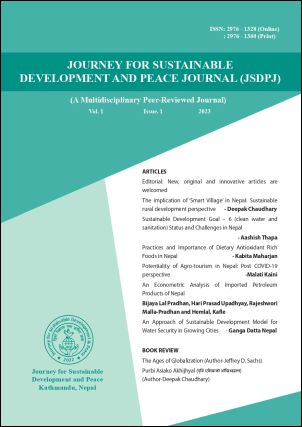The implication of ‘Smart Village’ in Nepal: Sustainable rural development perspective
DOI:
https://doi.org/10.3126/jsdpj.v1i1.52595Keywords:
Migration, smart villages, sustainable development, technology, youthAbstract
The main objective of the study is to discuss the importance of ‘smart villages’ in Nepal considering it would enhance rural and local development. The analytical review literature of both theoretical and empirical data and documents and observation as methods are adopted for the study. The majority of the population in Nepal resides in rural areas. Similarly, rural-urban migration is common. There is a wide gap between rural and urban in terms of infrastructure development and poverty. The rural population stands for 27 % of poverty, which is higher than the urban (15%). Many parts of the local levels face a lack of infrastructure, poor public services, and technologies. The exodus of youth from villages has resulted in decreasing agriculture production. Considering topography, population, limitation of land, and migration trends; the concept of smart villages is rational and it will have evident implications for rural development. The concept of smart villages will sustainably enhance the rural economy, minimizing the rural-urban economies gap.
Downloads
Downloads
Published
How to Cite
Issue
Section
License
This license enables reusers to distribute, remix, adapt, and build upon the material in any medium or format for noncommercial purposes only, and only so long as attribution is given to the creator.




